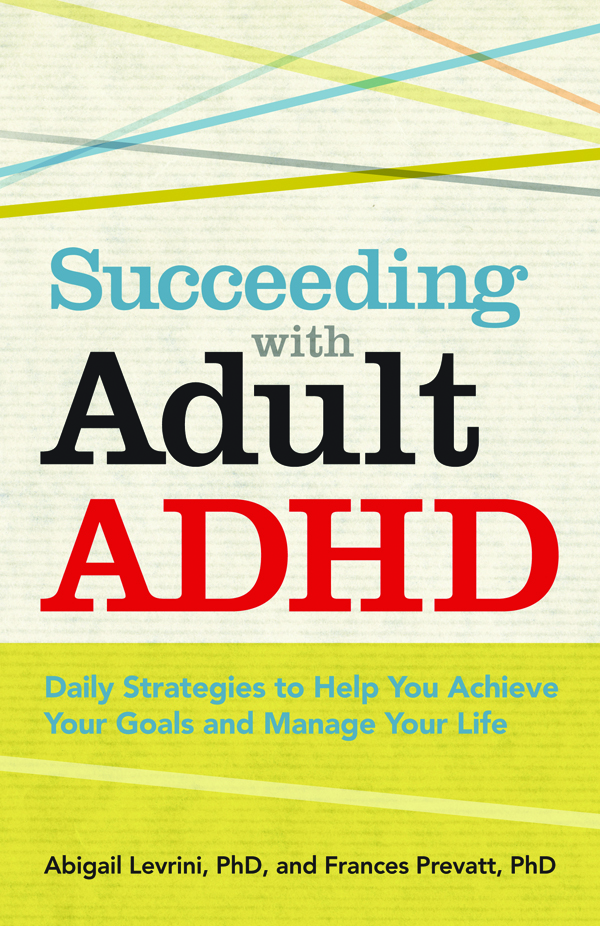
For young adults with attention deficit hyperactivity disorder (ADHD), successfully navigating their college days and early careers can sometimes seem like an insurmountable task.
Fortunately, self-help is on the way from Florida State Universityin a concise, straightforward guide tailored to fit the individual learning styles of its target audience while helping them manage their lives.
Already flying off the online shelves at Amazon.com, the book, “Succeeding with Adult ADHD: Daily Strategies to Help You Achieve Your Goals and Manage Your Life,” was cowritten by educational psychology ProfessorFrances Prevatt of the Florida State University College of Education. Prevatt serves as executive director of the Adult Learning Evaluation Center (ALEC) at Florida State, which specializes in the assessment of college students with ADHD and other learning disabilities.
“I’d been working with college students who have ADHD for so long and had collected so many great ideas that I really wanted to write about it,” said Prevatt, who coauthored the book with her former graduate student Abigail Levrini. “The result is that our self-help book incorporates proven research with innovative features to deliver a truly unique resource.”

Most of the information in the book is based on Prevatt and Levrini’s extensive research at the ALEC, which provides affordable psycho-educational evaluations for adults with learning disabilities such as ADHD. Over the past decade there, Prevatt has supervised the evaluations of about 2,000 college students and developed an ADHD coaching program.
It’s not your average self-help book, according to Prevatt. Instead, “Succeeding with Adult ADHD” contains interactive features, such as worksheets and checklists that aim to make the content uniquely practical and interesting for individuals with ADHD.
“Individuals with ADHD have a difficult time reading, focusing and staying attentive,” Prevatt said.“They tend not to like reading books. They can’t remember things. They get bored easily. Unfortunately, many self-help books are hard to read.
“In contrast,” said Prevatt, “my coauthor and I think there are several novel aspects of our book.”
Each chapter begins with a brief list of yes-or-no questions that seek to draw readers in and help them discern immediately whether that particular chapter is relevant to their own needs.
“For example, the chapter on study skills asks, ‘Are the notes you take not very helpful later on? Do you read a chapter several times without it sinking in? Do you study for tests but your mind goes blank when it’s time to recall the information?’” Prevatt said.
The book’s chapters are broken down into short sections readable in 10 minutes or less, and start-and-stop graphics encourage the student to read just one section at a time.
Each chapter also includes a “real-life story” of an individual that illustrates both the difficulties encountered in living with ADHD and how that individual overcame them.
“Real-life research informs this book, but we present it in a very colloquial, interesting way,” Prevatt said. “There are lots of checklists, tips and activities interspersed throughout each chapter, so one doesn’t get bogged down with reading and remembering for very long without a break that involves active interaction.”
For those students for whom graduation looms, the most important chapter may be the one on finding a job compatible with their particular ADHD symptoms.
A one-page chart offers a list of about 20 characteristics or behaviors that describe positive work behaviors –– e.g., “I’m honest” or “I don’t give up easily.” First, the reader circles those that characterize him or her. The next page has a list of attributes that might be problematic –– for example, “I don’t like someone telling me what to do” or “I forget to show up for meetings.” After noting which of those traits apply, the third step takes the reader through a worksheet that solicits past history, skills and personality characteristics. Finally, readers are guided through the process of creating a “job match” profile.
“You can manage your life if you have ADHD,” Prevatt said. “There’s no cure, but our extensive research and clinical experience has shown that there are proven, practical paths to better coping skills and success.”
Prevatt said the research on ADHD over the past 10 years has been “explosive.”
“We know so much more now than we knew back in the ‘90s,” she said. “One big development is the focus on ‘executive functioning impairment’ as the basis for ADHD.Our book explains in layman’s terms what this means and how you can use that model to understand your behaviors and make changes. We also know more about how ADHD in adults and college students differs from ADHD in children. Much of the early work focused more on hyperactivity, but ADHD in adults is manifested very differently, so the treatment strategies need to be different.”
Recent research also has focused on the extremely high rate at which mental health issues occur concurrently with ADHD –– most often depression or anxiety. In addition, researchers now better understand the neuropsychology of drugs prescribed to treat ADHD, including why they work, how they work, how to deal with side effects, and how complicated it can be to find both the right drug and the right dosage.
These days, said Prevatt, understanding adult ADHD and intervening effectively is about not only knowing the symptoms (inattention, impulsivity, hyperactivity) but also recognizing the specific impairments –– among them poor driving, losing one’s job, difficulty managing relationships, or an inability to manage finances.
For more information on “Succeeding with Adult ADHD: Daily Strategies to Help You Achieve Your Goals and Manage Your Life,” visit the American Psychological Association website or contact Prevatt at (850) 644-9445 or fprevatt@admin.fsu.edu.




